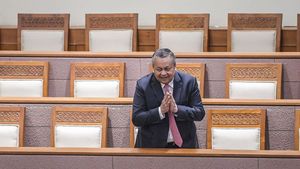JAKARTA - The rupiah exchange rate continues to weaken. Based on Bloomberg data, the Rupiah exchange rate on Thursday, June 20, 2024, the rupiah exchange rate on the spot market closed down 0.40 percent at the level of Rp. 16,430 per US dollar.
Similarly, the Jakarta Interbank Spot Dollar Rate (Jisdor) exchange rate of Bank Indonesia (BI) closed down 0.31 percent to a price level of IDR 16,420 per US dollar.
Governor of Bank Indonesia (BI) Perry Warjiyo said that the rupiah tends to go up and down, one of which is because there is a perception of fiscal sustainability in the future related to the next government. In addition, the volality of the rupiah is also caused by an increase in foreign exchange demand by corporations, including for dividend repatriation.
From a global perspective, the weakening of the rupiah exchange rate is also influenced by the impact of the high global market uncertainty, especially with regard to uncertainty in the direction of the Fed Funds Rate (FFR), broad strengthening of the US dollar, and high geopolitical tensions.
According to Perry, these factors made the condition of the rupiah exchange rate tend to go up and down, although it had strengthened at the level of Rp15,900 per US dollar, after BI raised the BI Rate to a level of 6.25 percent in April 2024.
Perry believes that the condition of the rupiah exchange rate at the end of the year will tend to strengthen, although it will not take place in the near future.
"Does BI believe that the rupiah will strengthen in the future? Yes. The fundamentals will strengthen, but from month to month movements, information factors will make the volatility fluctuate up and down, now that's what we continue to do," he explained at a press conference, Thursday, June 20.
SEE ALSO:
However, Perry estimates that the global and domestic economic fundamentals will improve, as it is estimated that the Fed will reduce the Fed Funds Rate (FFR) by the end of 2024 by 25 basis points (bps). In addition, the European Central Bank (ECB) has also lowered its interest rate earlier.
In addition, Perry said that Indonesia's economic fundamentals also tend to improve, as reflected in the maintained inflation conditions, relatively good domestic economic growth, good current account conditions, and still attractive returns.
"But patience, from month to month, there will be news that we call sentiment factors, uncertainty, such as that, these are factors that affect, do not affect trends, but the ups and downs of exchange rates," he said.
Even so, Perry did not explain in more detail regarding sentiment towards fiscal policies in the next government. However, he emphasized this is only perception. Persepsi, this is not necessarily true, don't believe it if it is perception," he added.
The English, Chinese, Japanese, Arabic, and French versions are automatically generated by the AI. So there may still be inaccuracies in translating, please always see Indonesian as our main language. (system supported by DigitalSiber.id)
















